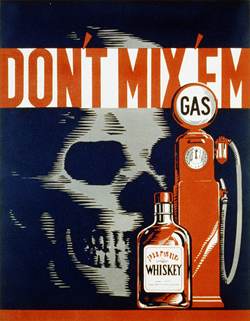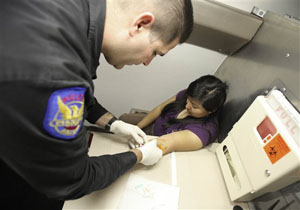
One in seven weekend nighttime drivers in California tested positive for drugs that can affect driving ability, according to a voluntary survey of drivers across nine cities in California. The survey was the first of its kind conducted in the state, which was an anonymous study that paid participants to submit to drug and alcohol tests and answer a series of questions. Some drivers were found to be over the legal limit, and were asked to stay at the site until a sober driver could retrieve them, and no one was placed under arrest.
The survey results were announced by the California Office of Traffic Safety. There were more drivers who tested positive for drugs known to impair driving (14 percent) than drivers who tested positive for alcohol (7.3 percent). Marijuana was the most prevalent drug found, and 7.4% of the drivers tested positive for it.
Of the 7.3% of drivers who tested positive for alcohol, 23% of those drivers also tested positive for at least one other drug. 4.6% of the drivers tested positive for illegal drugs, and 4.6% of the drivers also tested positive for legal, over-the-counter medications that could potentially affect driving ability. Of the 7.4% of drivers who tested positive for marijuana, 26.5% of those drivers also tested positive for at least one other drug.
Over 1,300 drivers voluntarily provided breath and saliva samples at the roadside locations set up across nine cities where the survey was conducted. The survey spanned from 10:00 p.m. to 3:00 a.m. on Friday and Saturday nights. The samples were collected during these times as a reflection of the peak times of impaired driving according to arrests reports. The breath samples were tested for alcohol, and the saliva samples tested for the active ingredient in marijuana (THC), major illegal drugs, prescription drugs, and over-the-counter medications known to potentially impair driving abilities.
The $650,000 study, as reported by the Orange County Register, was conducted by the Maryland-based Pacific Institute for Research and Evaluation. The study was paid for by federal funds and was conducted to supply data needs identified in the California Strategic Highway Safety Plan, which is, according to the California Office of Traffic Safety, a “dynamic action plan developed by federal, state and local government agencies, as well as organizations and advocacy groups dedicated to all aspects of traffic safety.”



 California drivers no longer have the option to choose which chemical test they may take when arrested for driving under the influence. The old law allowed a driver to decide whether they submit to a blood, breath, or urine test. Sometimes, the driver who submitted to a breath test would also be request to take either a urine or blood test, again one of their choosing.Revisions to this law prohibits the arrestee’s option of choosing a urine test, and instead requires that if a blood test is unavailable then they have automatically consented to giving a urine test. The new law states that a person only has the choice of a breath or blood test. If a person is unable to give a blood test and is exempted from doing so, then they must give a urine test.
California drivers no longer have the option to choose which chemical test they may take when arrested for driving under the influence. The old law allowed a driver to decide whether they submit to a blood, breath, or urine test. Sometimes, the driver who submitted to a breath test would also be request to take either a urine or blood test, again one of their choosing.Revisions to this law prohibits the arrestee’s option of choosing a urine test, and instead requires that if a blood test is unavailable then they have automatically consented to giving a urine test. The new law states that a person only has the choice of a breath or blood test. If a person is unable to give a blood test and is exempted from doing so, then they must give a urine test.